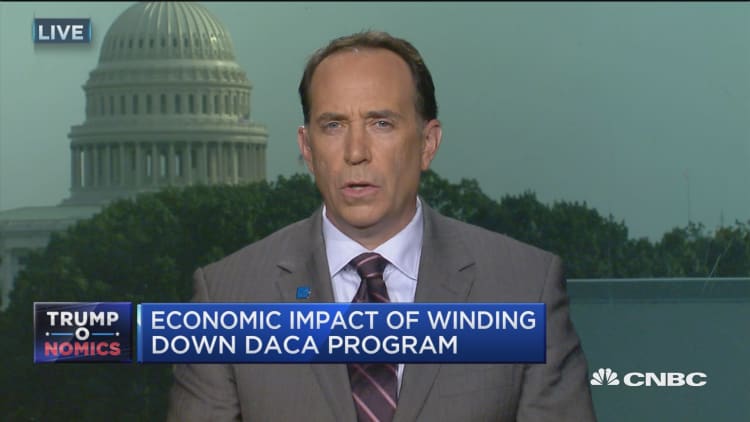
With the end of the Deferred Action for Childhood Arrivals looming, CATO Institute Fellow Ike Brannon said the economic impact of removing the Obama-era program could be massive.
"A study that Logan Albright and I did a few months ago for CATO looked at the economic and federal government cost of repealing DACA, and we estimated that the cost to the federal government alone would be about $60 billion over the next 10 years and the overall economic impact would be a little over $200 billion," Brannon told CNBC on Tuesday.
Brannon said that removing protections from those affected by DACA, many of whom entered the United States illegally as children, would cut more out of the economy than it would add.
Instead, it would likely result in productive workers being forced into working illegally to make ends meet, ultimately contributing less to the U.S. system.
"These workers, most of whom are in their 20s and hitting their peak earnings years, would end up not finishing college and taking jobs in the underground economy, earning much less and probably not paying any taxes at all," Brannon said on "Closing Bell."
Brannon added that it was "really unrealistic" to presume that the federal government would be willing to expend the resources necessary to deport all those affected by DACA.
But as far as budget goes, Brannon acknowledged that congressional Democrats and Republicans are likely to use President Donald Trump's DACA decision as a campaign issue.
"Everything is done in politics," Brannon said. "What worries me is that I think there's a lot of Republicans and Democrats who want to get this done. And my worry is that each side will see this as a campaign issue and refuse to do a bipartisan bill and let the thing die."
Attorney General Jeff Sessions announced Trump's decision on Tuesday, arguing that the DACA program was an indefensible "overreach" by the Obama administration. The White House granted a six-month delay to ending the program to give Congress the opportunity to act.


